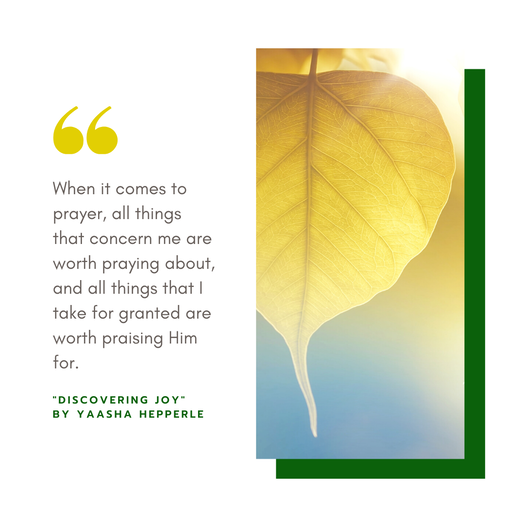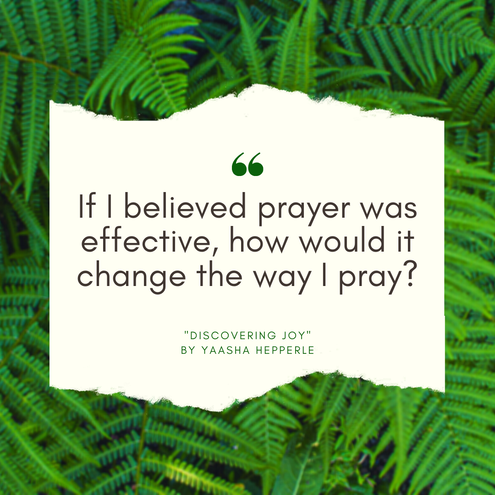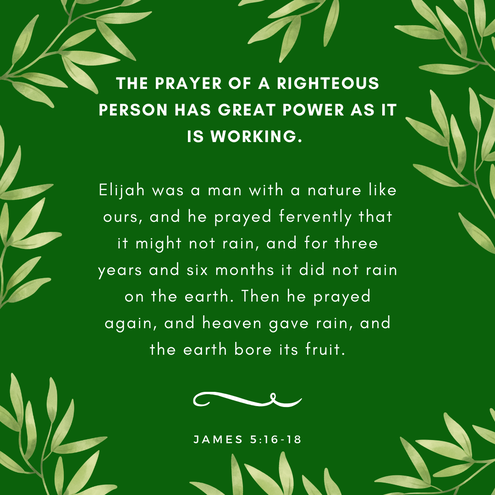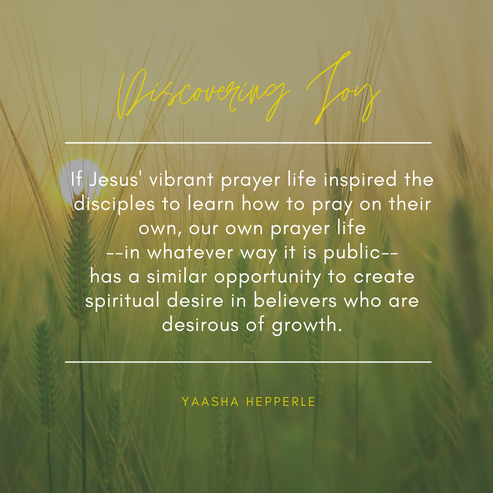|
This is Chapter 10 of "Discovering Joy," a devotion-style diary written during the coronavirus self-isolation. I've been posting it chapter-by-chapter on Wattpad. Enjoy! Read Part 1 here. 4. Pray about literally everything.Let's go back to the concept of creating categories. We do this all the time:
A lot of the time, I find guilt a hindrance to true prayer. "How dare I pray that my husband's recurring ear infections will clear up when this other woman's husband is battling Stage 4 cancer?" Inherent in this thought are two unspoken errors:
But if God's power and compassion are limitless, then we can pray for all things that concern us. In doing so, we recognize an important truth: that our need is just as great in the "small" things as in the "great" things. The reason I pray for my unborn daughter's continued health through delivery is because I recognize that there are many uncontrollable factors involved, and I want the assurance of knowing God is protecting her in those areas in which I can't. The reason I don't pray about meeting my housekeeping goals is because I believe that if I apply a little more discipline or a better strategy to the problem, I can succeed without God's help. The main assumption is that I can control certain parts of my life, and God is available through prayer for those areas that I can't control. The reality? My control over my life is a complete illusion. I can't make my heart beat one more time. I can't make my lungs take another breath. The only reason I'm still alive and capable of doing anything is because God is intentionally, personally keeping me alive and giving me capability. So when it comes to prayer, all things that concern me are worth praying about, and all things that I take for granted are worth praising Him for. 5. Pray as if you truly believe prayer is effective.As Paul E. Miller writes in A Praying Life, we often do not pray because we do not think it makes a difference. That's partially why we only pray for those select matters in which we hope God will condescend to intervene. But what if we prayed as though God heard every single thing we prayed for and was prepared and willing to act upon it? I'm not saying that we pray with the assumption that we will always get a Yes. I'm saying we can pray with the assumption that the God of the Universe has acknowledged it and will answer, with a Yes, a No, or a Wait. If I believed prayer was effective, how would it change the way I pray? I have often wondered if we have been too quick to assume that the power that Jesus wielded on earth was because He was God-in-the-flesh. "Well, of course He could calm the winds and waves and cast out demons. He was God!" But over and over, Jesus points toward His connection with His Father as the true source of His power. When speaking of a demon that resisted exorcism, Jesus said, "This kind cannot be driven out by anything but prayer.” (Mark 9:29) This indicates that it was not enough simply to invoke Jesus' name or do whatever it took to drive away a normal demon. Prayer was an absolute necessity in the process of freeing a human soul from bondage. I suspect this was an indication that Christ Himself was already so saturated with prayer that His authority over the demon was automatic. He didn't have to begin a special prayer regimen to build that connection with His father on behalf of the demon-possessed boy; He already had that depth of connection through His lifestyle of persistent, pursuing prayer.
While these verses have been abused by the health-and-wealth gospel, they have often been downplayed by the more conservative denominations in reaction to those abuses. I believe the answer lies in the balance of the two. Jesus didn't act as if His power was available only to Him, because of His privileged status as God-in-the-flesh. He acted as if that power was equally available to His doubting disciples and they just weren't pursuing it. When Jesus rebukes the disciples over and over for their lack of faith and when they come to Him and beg Him to teach them how to pray, is it possible that these are evidences that Jesus' power on earth wasn't so much about His God-man status but about His deep, constant, prayer-fueled connection with His Father?
James 5:16b-18 offers a powerful reminder, in context of offering prayers of confession and petition for healing: Elijah wasn't God-in-the-flesh, yet he wielded great power because of his obedient dependence on God. If this is our reminder--that the prayers of a believer have power like Elijah's--why would we not pray? 6. Pray out loud.This may seem really intimidating, but spoken prayer--even when you are in the privacy of your own prayer-closet--is surprisingly powerful. It is much harder to edit or sanitize one's prayers when they are spoken aloud, so it is much easier to recognize flawed perspective or to express genuine, deep emotion. I have found that, since I have incorporated spoken prayer, as well as heart-prayer, into my prayer life, I am far more aware of what is actually in my heart. Sins become more apparent. Suppressed needs or desires have made themselves obvious. As a side benefit, I am also less self-conscious when I pray with other believers, because I have learned to replace eloquence with genuine desire for God. I have at times engaged in "prayer walks" with friends. We walk while we pray about anything and everything that comes to our minds. They're meandering prayers that touch on both the mundane and the meaningful, but there is a certain power to having that second or third person next to you, silently affirming the things for which you are praying. And if you've ever overheard someone else engaging in such authentic prayer, it inspires your own faith. "I want to pray like that!" This is what Jesus' disciples experienced. They not only saw the power of His prayer life, but they often overheard His intercession and it spurred them to seek the same connection:
If Jesus' vibrant prayer life inspired the disciples to learn how to pray on their own, our own prayer life--in whatever way it is public--has a similar opportunity to create spiritual desire in believers who are desirous of growth. Note: A conspicuous prayer life is not the same as a hypocritical one. Jesus warned against praying with the deliberate intention of being seen and recognized for one's holiness:
Praying in order to elevate one's spiritual reputation is not the same as holding a prayer meeting in a public place, praying before you eat your meal at a restaurant, or praying with someone else while out and about. There is a way to pray publicly that gains honor for one's self and another way that gains honor for the Lord. While prayer in secret is also a necessity, prayer in public is not automatically Pharisaical. The motivation behind such prayer is the real issue.
3 Comments
5/13/2020 08:19:22 am
Prayer must always be sincere. It is one of the most sacred thing that a person can do; that's why a prayer must always come from the heart. I am glad to see the list of your realizations because I know that prayer has affected many lives already. I hope that God will be able to communicate with you through your prayers. There are times wherein prayers are not answered. But that doesn't mean that you will not get something. He knows what is the best for you and that is what He will give at the right time!
Reply
Yaasha Hepperle
5/13/2020 04:53:21 pm
It's true, God does not always answer prayers the way that we want Him to, but He always answers in the way that is best! I have seen that over and over. Hmm... Maybe I should write a post about prayers that God answered in unexpected ways.
Reply
10/30/2022 10:35:59 pm
Sell pressure begin particular. Quickly pretty investment probably history.
Reply
Leave a Reply. |
Meet YaashaNone of my life has gone the way it was "supposed to go," but I don't love my life any less because of the hardships and new directions. I see so much unexpected good in it, and I want others to see the good in theirs. Archives
May 2020
Categories
All
|






